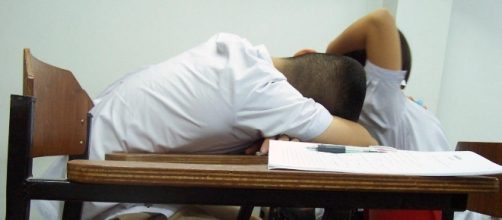There is no question that getting enough sleep is a biological necessity. The National Sleep Foundation has come out with research that identifies how much sleep each age group needs to function at their peak. Newborns (0-3 months), needing the most sleep out of any age group to "support their rapid mental and physical development," should get between 14-17 hours. school-aged children (6-13 years) need 9-11 hours, teens (14-17 years) 8-10 hours, and young adults (18-25 years) between 7-9 hours of sleep each night. The effects of not getting enough sleep can seem insignificant but can lead to terrible, lasting consequences like depression, poor impulse control, tobacco, and alcohol use, impaired Cognitive Function, and lower performance in academics.
California's new bill
A bill in California is setting out to change the standard for school start time with the hope of combatting the negative affects sleep deprivation is having on students. This bill proposes that the schoolday for middle schools and high schools will begin no earlier than 8:30 a.m, with many sleep and psychology experts on their side.
Following the sleep recommendations listed above, the average student should be going to sleep at around 9pm every night. But with strenuous classes, changing hormones, and extracurricular activities like sports, music, clubs, and part-time jobs, the average teenager goes to sleep around 11 or 12pm. Waking up at 5 the next day for school means that on average, teenagers are only getting 5-7 hours of sleep -- something that doctors say is limiting students' ability at school and potentially damaging them for life.
Consequences of early start
While the debate over standardized tests continues, the majority of K-12 curriculum is geared toward a student's ability to perform in this environment. Research by the Council of Great City Schools found that students take about 113 standardized tests during their 13 year education. These tests determine class placement, college acceptance, and even school funding, so their importance cannot be ignored.
In order to do their best, test prep classes, courses, booklets, and websites emphasize the importance of a good night's rest and a calm mental disposition. Unfortunately, many students are not able to get these things, which has been proven to negatively impact their overall performance and future opportunities.
One article published in the British Medical Journal connects moderate sleep deprivation and alcohol intoxication, saying that after 17 hours without sleep, subjects performed at the same level as someone with a BAC of 0.05 (the legal limit in Utah).
The consequences of sleep loss or sleep deprivation are: heart disease, heart attack, heart failure, depression, high blood pressure, weakened immunity, weight gain, and trouble with cognitive functions -- leading to car accidents and manic behavior. Sleep is critical for many body functions like memory, learning ability, digestion, metabolism, immune health, and balance.
The opposition
Though the benefits seem to make the passing of this bill an easy choice, there is still some opposition to this legislative action.
Teachers in Montgomery County have raised concerns over shifting schedules that could affect a policy change there. The main argument against altering school times is how it affects the family dynamic in many major cities. Some students depend on early-relase schedules that allow them to get to after school jobs and to take care of younger sibling while their parents work. There is also concern over the late nature of extracurricular activities that would need to adapt to the new schedule.
The debate over school start time is a long battle with more than one outcome. In the end, a compromise between school start time and lessening the academic burden on students may be the solution.


